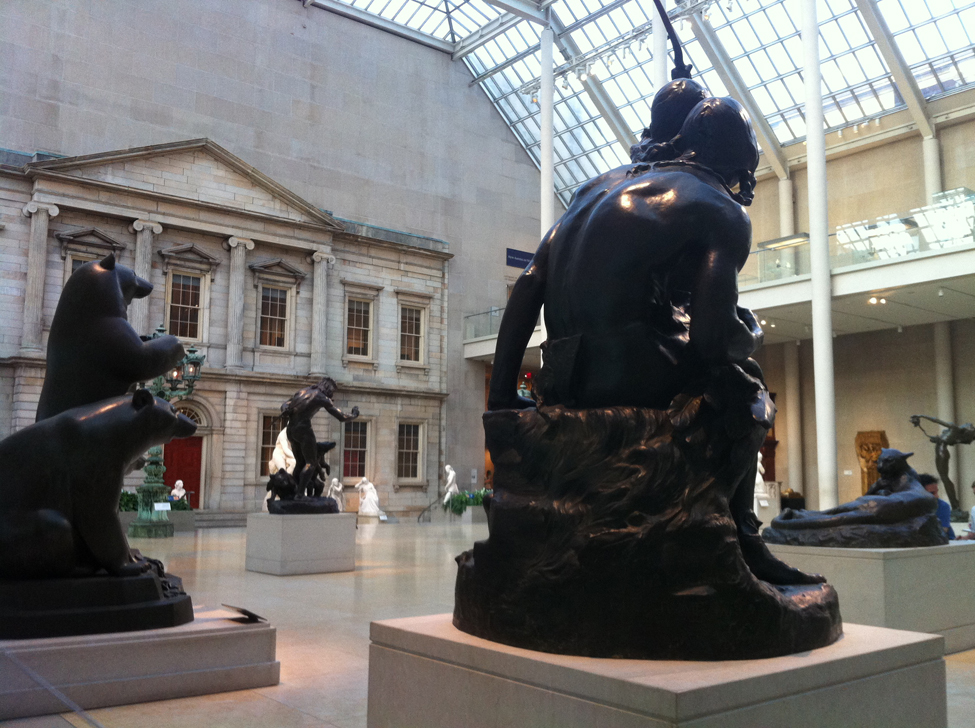XLVIII
Dizraeli: Jewish British Conservative PM and trumpet player.
Lost in discovery.
It all depends on who you mean by The People.
We the purple
Weed the people.
Digital wheels are not round. They are non-Euclidian “as-ifs.”
Oh how we strut about
jingling chains
made by other slaves.
Baldwin: …Those kids are romantic, [speaking of the ’68 generation] not even revolutionaries. At least not yet. They don’t know what revolution entails. They think everything is happening in the present. They think they are the present. They think that nothing ever happened before in the whole history of the world.
Mead: That maybe gives them a kind of strength.
Baldwin: Oh, no, baby.
Mead: Oh, yes, right in line with what we have been saying. Because the more you narrow it, the more strength you have to act.
Baldwin: No, no, no. I don’t believe that either. I think that the act of narrowing it is a very self-conscious act. To think it’s narrow is one thing, and to narrow it deliberately is another. You have to be forty to narrow it. Nobody narrows it at twenty. They can’t. They can’t see back. There’s nothing to look back on.
Mead: There again, you’re taking in a sense the individual as a kind of model.
Baldwin: But I’m a poet.
Mead: Yes, but I’m not.
Baldwin: Oh, I don’t agree with you. I don’t think that’s true. I think that you and I, for example, have met and understand each other and are committed to each other because we really, no matter what the terms may be, have the same commitment. And that commitment is to the human race.
Mead: But I don’t thin that makes one a poet.
Baldwin: That is what makes you a poet.
Mead: See, I think what makes you —
Baldwin: And there’s nothing you can do about that.
Mead: I acknowledge the commitment and I think we have mainly communicated in poetry. You see, all the conversation that we’ve been having is primarily this poetic communication. It’s not prose, it’s poetry.
Baldwin: But that’s very important, isn’t it?
Mead: Sure, it’s poetry and not prose. But I’m not a good poet.
Baldwin: Neither am I, but I am a poet. I’m saying it really for me. It’s very difficult for me to say I am a poet. I don’t mean anything about my talent, whatever it may be. That has nothing to do with it. I’m not vain about those things at all. There’s far too much to learn, so many things to do. I’m talking about a certain kind of responsibility and that is really toward the future, however mystical that may sound.
Mead: No, I agree.
Baldwin: One, is a commitment to generations unborn. That is what it is all about. And I don’t care what word one uses, poetry or prose; it doesn’t make any difference. That commitment is very, very rare, and we cannot fail each other because whatever it is you have or whatever it is I have does not belong to you or to me. It belongs to all of us.
Mead: Yes.
Baldwin: We are meant to be witnesses to a possibility which we will not live to see, but we have to bring it out. It has nothing to do with you and nothing to do with me. It has to know with what we know human beings have been and can become, and that is so subversive it is called poetry. Check with Plato.
Mead: Yes, checking with Plato, that would be so. But Plato was not a poet.
Baldwin: That’s why he didn’t want any poets in his republic. It took me a long time to understand that, a long time. But he described poets as disturbers of the peace.
[What is it that is meant by “peace”? This is a very tricky word. Is peace something that indicates the absence of conflict? A slackening of contending energies? Is this possible in nature? Can peace be kept? Or made?]
Mead: Yes.
Baldwin: And it took me a long time before I realized what he meant by that. But that’s exactly what you are, aren’t you?
Mead: A disturber of the peace.
Baldwin: And that peace has always got to be disturbed. That’s the point; that’s what’s meant by the angels troubling the waters. Right?
Mead: Right.
Baldwin: Okay? I’m having fun, if you don’t mind.
Mead: Of course I don’t mind.
Baldwin: Great!
From A Rap on Race
Reflux of undigested history.
What, O what, will give us the enzymes to process this? Surely not narrative alone.
If the lampshade fits, wear it.
Chronic ills of a debt foreclosed.
The blizzard was so sudden, so filled with beauty and possibility we wanted to get out into it and work the snow. And out of our play came a figure that looked enough like a man for us to call it a man. So we borrowed one of Daddy’s pipes to lend him a positive attribute, and a carrot for a nose; coal smile. And a straw hat to make him somehow a man of the earth. We named him Jim – which was short for The Epoch of Bourgeois Liberal Democracy. And now, little by little, this world is growing warmer.
All that is solid melts into air? Tell that to ebola.
Dear John:
Many thanks for your good words. I hope “Macbeth” was the howling success it clearly deserved to be.
Well, I’m here to report that, definitively, on the other side of 64 one needs no hallucinogens, reality is sufficient.
Forty-five years ago plus a day, and a few hours, I was watching four guys in dresses turn over a police car on Christopher Street. And I was tripping. And helping.
Today, the strongest thing I’ve had is coffee, and Gwen, soon to turn 22, sends an email from the city of Hue. She’s heading north soon, toward the Ben Hai river and the 17th Parallel.
Don’t remember if it was the first or second night of the Stonewall Riot, but I trashed a Manufacturers Hanover Trust window at the corner of Waverly and 6th and just a few minutes ago, right in front of my building, passed a couple of guys wearing rainbow teeshirts with Citibank logos.
Somehow the strangest part of all this is that it doesn’t really feel strange.
Keep me posted on all fronts.
xoxox, E.
We begin, then, with the position that poetry is an indefinable essence that can manifest itself either in the form verse or the form prose. Most poets have traditionally written their poems in one or another kind of verse, according to the prosody of their native tongue, but the presence of what we are forced to recognize as poetry makes itself widely felt in prose.
If we cannot define poetry, though, we usually feel strongly as we read that we know when it is present. We know the chief symptom by which it manifests itself, and that is imagery, and the habit of thought that underlies imagery… wrote Theodore Morrison oncet in his essay “What is it Like?: Explorations in Metaphor.” [With thanks to his granddaughter Jessamyn Smyth.]
If you want to embody the dao, just breathe.
One problem with causality as a description of how reality works is that one tends to think of one’s self as either the causer or passive recipient of the action. This can easily lead to logic such as: Obama caused the leaves in New England to turn color by winning the election. Or, McCain caused the winter by losing the election. And then one extends this to the next logical thought. Western logic, as it turns out, being the most magical thinking of all since it produces mysteries which it explains with miracles. Nowhere in this constant skidding between poles is the simple processive allowed for: the constant, incremental working out and working through of tendencies in dynamic play. Can one really say where the winding ends and the unwinding begins? Does a horse gallop any faster for our knowing that, for an instant, it is airborne?
Fronteras sin fronteras.
Keep rom and com on.
There is a fascinating book by Ernst Kris and Otto Kurz on the legends connected with art and artists [that recounts] stories [from] all over the world of images that had to be chained to prevent their moving of their own accord and of artists who had to refrain from putting the finishing touch to their paintings to prevent the images from coming to life. Writes Gombrich, op. cit. p. 111, in reference to the book De Legende vom Künstler (Vienna, 1934).
Soften and steady the gaze. Looking too sharply and moving the eyes too swiftly can wound the heart.
Let strange equal strange.

One banned man.
Does Book of the World Courant have an intention?
Sí, por supuesto. Which is to evoke an alternative and imagery-rich language, a departure from ordinary language. Through this departure, the everyday mind is by-passed, allowing one to engage with another more subtle mode of perception, which in turn allows one to discern and engage with the almost imperceptible movements and changes taking place within the world and our bodies.
The above paragraph was appropriated, mutatis mutandis, from Bisio, Decoding the Dao.
As is the following: For readers of Book of the World Courant, text and image are inextricably intertwined like the warp and weft of a fabric.
Baldwin: …I cannot lie to myself about some things. I cannot… I mean that I have to know something about myself and my countrymen, and the most terrible thing about that… is not the looting, the fire burnings or the bombings: that is bad enough. But what is really terrible is to face the fact that you cannot trust your countrymen. That you cannot trust them. For the assumptions on which they live are antithetical to any hope you may have to live. It is a terrible omen when you see an American flag on somebody else’s car and realize that’s your enemy. In principle it is your flag too, but the man who is flying the American flag is going to kill you. You, his brother. You, his countryman. That is what that flag means. Ask Southeast Asia if you doubt me. That is a bitter, bitter pill, but it is like that.
Mead: I am not denying any of these facts. What I am trying to consider is whether there is an inevitable difference in the spiritual stance, for you who are black and me who am white.
Baldwin: We can’t talk about the spiritual stance unless we are talking about power!
From A Rap on Race.
But before this, slightly earlier in their dialogue, the following exchange occurs:
Mead: …You have dealt in your writing over and over again with the situations in your life. You have dealt with them because it illuminated the situation of black people in America or in the world, which is terribly significant to illuminate.
Baldwin: I wish I could illuminate the position of the white people in the world.
Baldwin’s argument that blacks are the unacknowledged children of an America which defines itself in relation to its whiteness, reminds one of the situation faced by children of narcissists. Narcissistic parents cannot, categorically, acknowledge the existence of their children as autonomous others. They can, however, and, in fact, must, perceive them as projections of themselves, positive or negative depending on the psychic needs that are entirely reflexive.
One characteristic of the narcissist is the incapacity to experience her or himself as real, and for good reason: they have no internal structure. Either a robust self never formed, or it was forced to become a black hole under the pressure of overwhelming stimuli. What appears to be a self is merely an elaborate construction of projective impulses. In order to survive, narcissists create an imagistic exoskeleton in place of a self. In the absence of a true “I,” how is it possible for them to extend a genuine “Thou” to others, even when those others are, forensically, their children: a product of their own material existence? Or their brothers and sisters.
As a nation, America possesses characteristics both of narcissism and autism, however “high-functioning” we may appear to be. And this is the situation, to Baldwin’s everlasting pain, to which he is acutely sensible. He, like so many others, albeit with a greater rhetorical brilliance, and perhaps a deeper sense of love, expended vast quantities of his energies in an attempt to somehow goad his country into a lucid moment.
What he could not come to terms with, ultimately, was the fundamentally dispositive nature of the pathology he faced, and of which he was a product. His blackness and gayness lent him, to some extent, an immunity from the worst aspects of his country’s pathology: he was the one-eyed man in the land of the blind. Baldwin, like so many other abused, and preternaturally wise children, simply could not believe that narcissism and autism could stand unchanged in the face of reason and, indeed, love. That they could repudiate them because they were inimical to their essential functioning. He did not grasp, how could he?, that the situation was structural. He believed, to his core, in the power of healing. If he could change, he reasoned, so could America. If he could face his demons, and accept them as constituent parts of himself, surely his country could too. With the right kiss, the divine kiss, the monster might be transformed.
Missing from all of this is the understanding of disposition, of how things are disposed. When Baldwin cries ask Southeast Asia! it is clear that he sees American foreign policy as mistaken, as something that might be changed with the requisite degree and quality of awareness. Perhaps when he uttered that phrase, it seemed a reasonable possibility. The succeeding forty-five years have shown that he was chanting for a miracle. And that no matter what he had learned about the nature of his own internal life, when it came to politics, he was still “crying holy.”
Poetry, writes Morrison above, arises from image, from metaphor. Here is the poetry written on the cover of The Daily News, “New York’s Picture Newspaper,” for July 2, 2014, the morning after the defeat of the U.S. team in the World Cup.
But compared to what?


